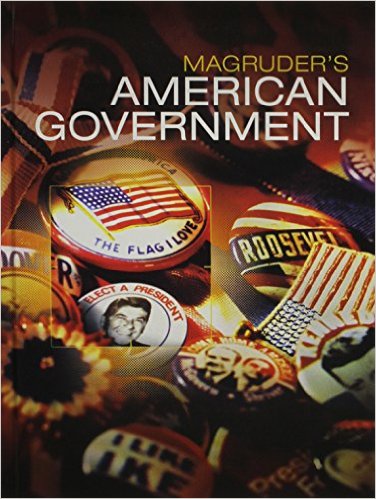
Magruder’s American Government
1st Edition
ISBN: 9780133306996
Textbook solutions
All Solutions
Section 4-6: Congress at Work – Making Laws
Exercise 1
Step 1
1 of 2
The Rules Committees influence the outcomes of a bill passed more than the Sponsor because the bills sent have to be evaluated and considered by the committees.
Result
2 of 2
The **Rules Committees** have a **more significant influence** on the outcome of a bill than Sponsors.
Exercise 2
Step 1
1 of 2
The complaints stem from the fact that an individual of a minority party can significantly influence the legislative and debate process that the majority might be taking part in. This is sometimes done to avoid voting on a political matter, which slows down the legislative process.
Result
2 of 2
Because a minority can **significantly influence the flow of a legislative process** that the majority can be having.
Exercise 3
Step 1
1 of 2
The purpose of the procedure is to have more time in the evaluation of the bills. The Rule Committee can choose the time for a particular bill to be voted upon. This allows them to put important bills to attention and save those who do not seem urgent for later.
Result
2 of 2
The purpose of the special procedures to bring bills is to have time to **properly evaluate them** and give attention to the ones considered important.
Exercise 4
Step 1
1 of 4
The **similarity** is that both can bury a bill because they have the right not to give it action or attention. Both of the terms usually regard the bills that are not worthy of attention.
Step 2
2 of 4
A **pigeonhole** is when a bill is put aside without the committee’s consideration for it. This is usually the case because many of the bills are passed for the committee’s review, most of them are pigeonholed.
Step 3
3 of 4
A **pocket veto** is when the president or a state governor leaves the bill unsigned for too long for the legislative process to deal with, it is then set with an indirect veto. The president does not even have to veto the bill; he has the right to pocket veto by taking no action.
Result
4 of 4
Both terms refer to ignoring the bill. **Pigeonholed** are put aside by the committee’s while **pocket veto** is when the president takes no action regarding the bill.
Exercise 5
Step 1
1 of 3
All of the given entities are important in the process of passing the laws. The **president** has the power to **either sign the bill or reject it**. The president can also send the bill back for adjustment. He is an essential part of approving laws. Even though, if two-thirds of both houses agree, the law will be enacted.
Step 2
2 of 3
On the other side, the **committee** can either consider the bills or pigeonhole them. This means that some bills might not even publicly come out because of committees’ decisions.
Result
3 of 3
The **committee** is **probably the most important** because of **the ability to give attention to the bill or avoiding introducing a bill**. This means that some bills will not even touch the president’s table because the committee decided so.
unlock

